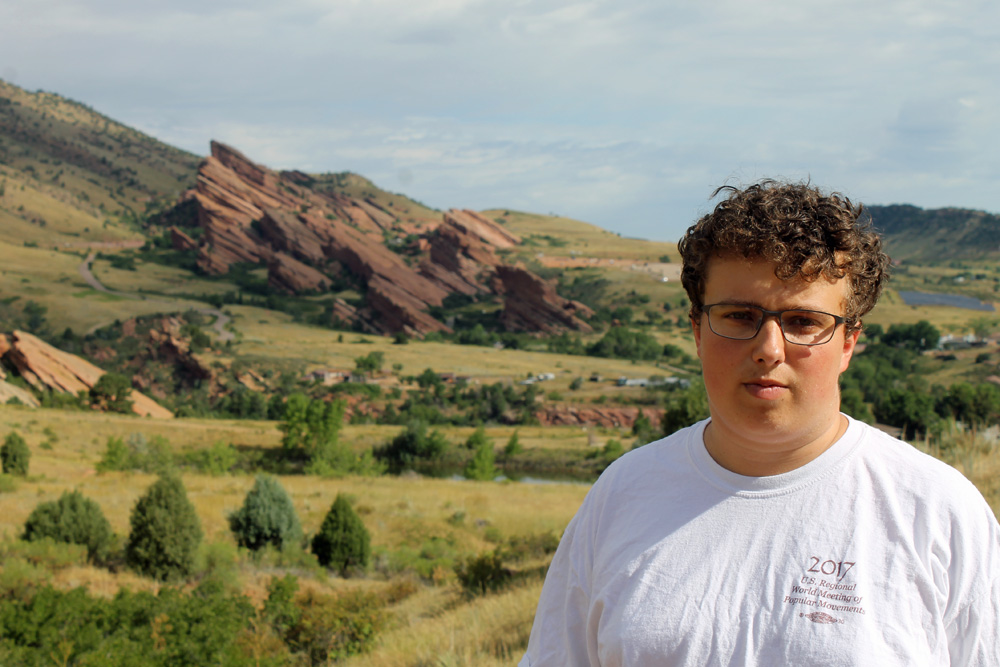
Nick Venner of Lakewood, Colorado, is among the 21 youth plaintiffs suing the federal government for its inaction on climate change. The young people claim that the government's lack of substantial efforts to limit greenhouse gas emissions, while subsizing the fossil fuel industry, has jeopardized their constitutional rights to life, liberty, property and a stable climate. (NCR photo/Brian Roewe)
Editor's note: This is the first story published in EarthBeat, NCR's new climate portal.
On most days this summer, you could find Nick Venner out walking along the Mount Falcon Trail here outside the suburbs southwest of Denver.
The trail, south of the Red Rocks Amphitheater, is a perfect blend of proximity and wilderness for Venner. The 18-year-old lives just 20 minutes away in Lakewood. And on this particular August day, exploring the wilderness meant crossing paths with not one but two rattlesnakes.
In the foothills of the Rockies, the trail is popular with early-morning runners and dog-walkers alike. It features a landscape of faded shades of green and brown and nothing but sky above. Near the top, Denver comes into view in the distance. Depending on the day, how much of the Mile High City is actually visible is subject to what's lingering in the air.
"Some days it'll look like this where it's pretty clear," Venner said. "But there are some days where you just can't see it at all."
Asthma renders Venner sensitive to air quality levels and fuel emissions. But it's not the only reason.
At first glance, he appears like a typical American teen. He just started college at Metropolitan State University of Denver. Along with hiking, he enjoys streaming "Dark" and other science-fiction shows on Netflix, playing video games, tinkering on his computer and riding his electric bike.
But he's also unlike most kids his age in one particular way.
Venner is suing the federal government over climate change.
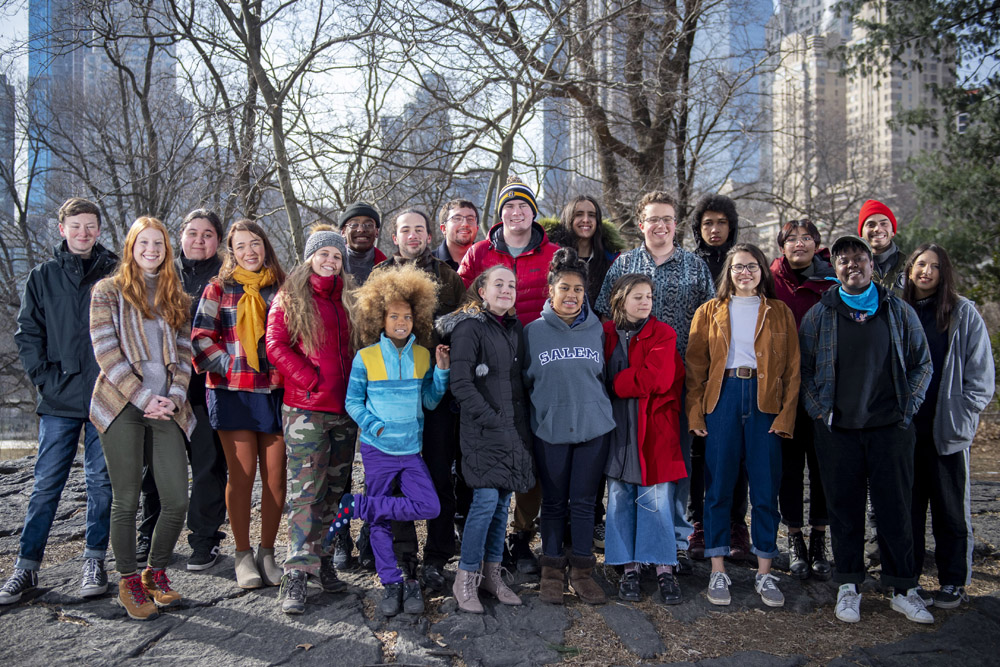
The 21 plaintiffs suing the federal government for inaction on climate change gather in New York City's Central Park. Nick Venner is seventh from the right. (Robin Loznak/Our Children's Trust)
He is one of 21 youth plaintiffs in Juliana v. United States — the groundbreaking lawsuit that argues the U.S. government has facilitated the growth of the fossil fuel industry, despite having knowledge since as far back as 1965 of how high levels of carbon dioxide pollution can destabilize the planet's climate system. The suit alleges that future generations are disproportionately harmed by climate change, and the lack of government action to limit heat-trapping atmospheric gases, with the U.S. as the largest historical emitter, represents a violation of the plaintiffs' constitutional rights to life, liberty, property and a life-sustaining stable climate.
The case, filed in 2015 against the Obama administration, seeks zero monetary damages. Instead, it asks the court to force the federal government to put forward a plan to curtail greenhouse gas emissions at the speed and scale required to avert catastrophic levels of global warming.
The David-vs.-Goliath dimensions of the case have brought it worldwide attention, growing ever more as it's survived several challenges and attempts to dismiss. It also has plenty of critics, raising doubts about the climate as a constitutional right argument and whether the judiciary is the right avenue at all to bring about a national climate plan. Whether it lives up to its billing as the latest "trial of the century" may depend on it actually reaching trial. That was set to begin in last October 2018, but a petition by the Trump administration has stalled it in the 9th U.S. Circuit Court of Appeals.
In the lawsuit, Venner calls climate change "a threat to human civilization." He describes how wildfires have devastated forests in Colorado, including some of his favorite spots for camping and fishing. He adds: "Not being able to recreate in the forest the same way I used to be able to reduces my level of activity, which harms me physically, and infringes on my enjoyment of the natural world."
He also talks about how, as a Catholic, his faith is intertwined with environmental stewardship.
"Catholic morals really do map really well on the issue of climate change and solutions," he told NCR, pointing out that Pope Francis often talks about the "climate emergency" in terms of not just worrying about one's own life, but about the most vulnerable and future generations as well.
When Venner, seated underneath a pavilion near the Falcon East trailhead, is reminded that he's been a party to this case since he was 14 years old, he pauses for a moment before saying, "Oh jeez, it's four years old."
"Dear God."
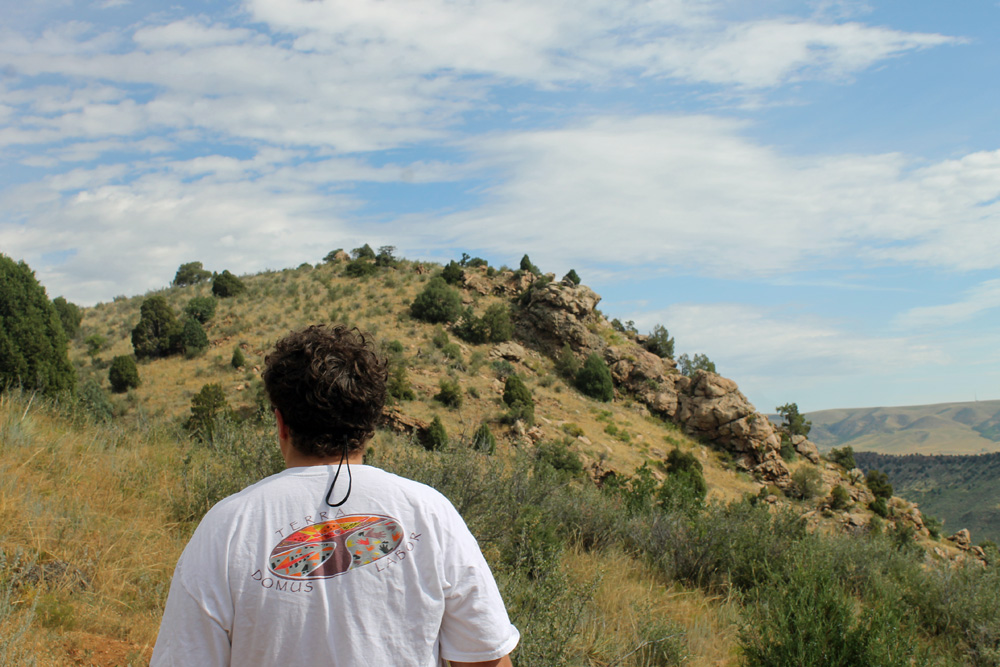
Nick Venner, 18, spent much of this summer on the Mount Falcon Trail in Morrison, Colorado. Why? "The fact that it is both wild and extremely close," he told NCR during a hike. (NCR photo/Brian Roewe)
Joining the lawsuit
How Venner joined the case can be traced back partly to the pope.
Or at the least, the two paths intersected.
In July 2015, just a month after Pope Francis released his landmark document, "Laudato Si', On Care for Our Common Home," Venner joined his mom Marie on a trip to Portland, Oregon, for the annual Social Action Summer Institute. That year, the gathering of Catholic diocesan social justice directors focused squarely on the pope's new encyclical devoted to the environment and human ecology.
When a copy of the encyclical leaked to the press days before its official release, Nick and his mom used Google to translate it — still a point of pride for the younger Venner as perhaps one of the first to do so.
"That was the first time that I had read it, and at the time, I was thinking, 'Wow. Wow! This is it!' " he said, the volume of his voice rising with each word. "This is it. It's done."
Done, as in it represented a "turning of the wheel" for not only the Catholic Church to seriously speak out and address climate change, but for the entire world.
"I was thinking that we would see climate change proposals like the Green New Deal happening in like two years after that," Venner said.
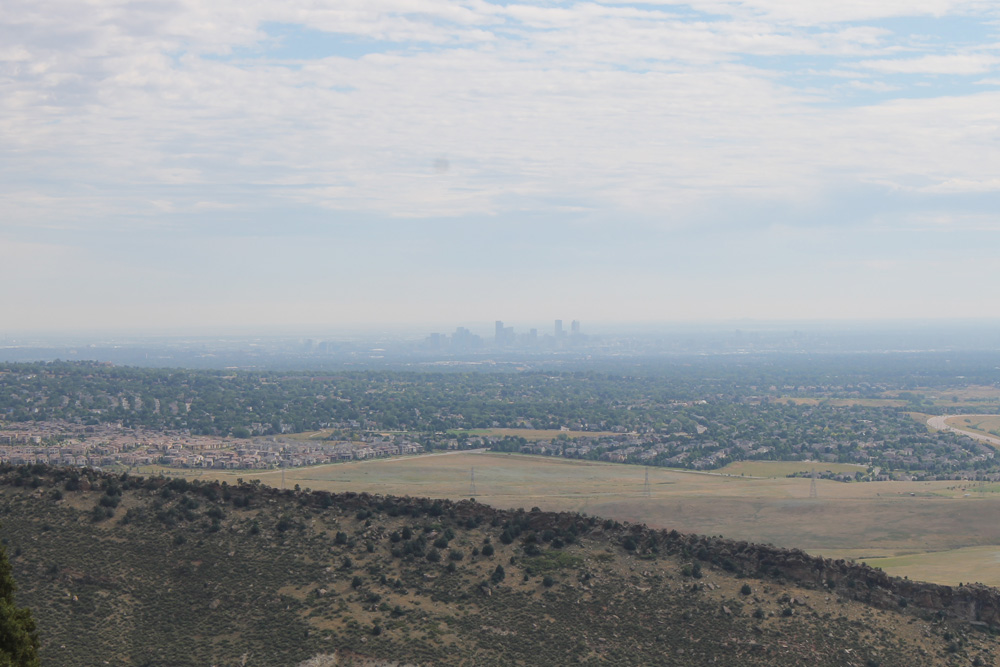
The Denver skyline is seen from the Mount Falcon East Trail, in Morrison, Colorado. (NCR photo/Brian Roewe)
As it turned out, it would take double that time for such sweeping national climate proposals to emerge, and so far they remain just that: proposals.
It was during the Catholic social justice gathering — an event he says he still remembers fondly — that Venner met face-to-face for the first time with Our Children's Trust, the legal team that was preparing the Juliana case.
Nathan Bellinger, a staff attorney with Our Children's Trust, remembers Venner's excitement and passion during his interviews. While the nonprofit legal group was insistent on finding plaintiffs interested in the case on their own, and not pressured by parents, Bellinger said it wasn't uncommon for parents to join the initial conversations. That wasn't the case with Venner.
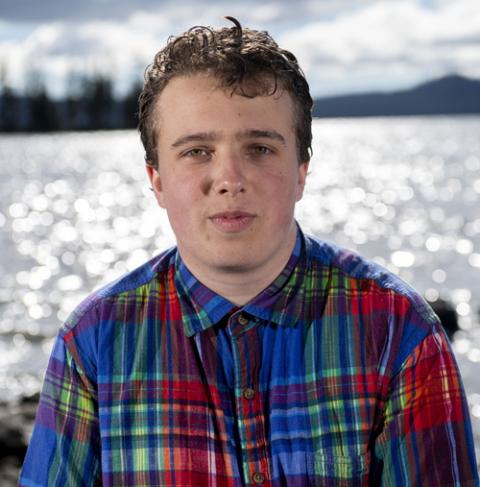
Nick Venner, 18, of Lakewood, Colorado is among the 21 plaintiffs suing the federal government for inaction on climate change. (Robin Loznak/Our Children's Trust)
"I definitely remember Nick leading the conversation," Bellinger told NCR. "It was clear right off the bat that Nick wanted to do this."
Venner, then 14, described how his concern about climate change stemmed from his Catholic faith and the new papal document. He also impressed the legal team with his knowledge of the climate science and its impacts in Colorado. That deep understanding stood out to his fellow plaintiffs, too.
Jacob Lebel of Oregon remembers being struck by Venner's grasp of the scientific basis of climate change, and for generally being "brilliant" in math and physics.
"Definitely very, very dynamic and engaged with everything around him, I'd say," Lebel, now 22, told NCR.
One of the most attractive parts of the case for Venner is that rather than seeking monetary damages, if successful it would force the federal government to put forth a deep decarbonization plan. Once he saw that, he had the feeling "this might really be something."
Bellinger said that that aspect of the case was appealing for many of the plaintiffs.
"What we were seeing was that there were young people that were really active on various environmental issues, including climate change," the attorney said. "And some of them were just wanting to do more."
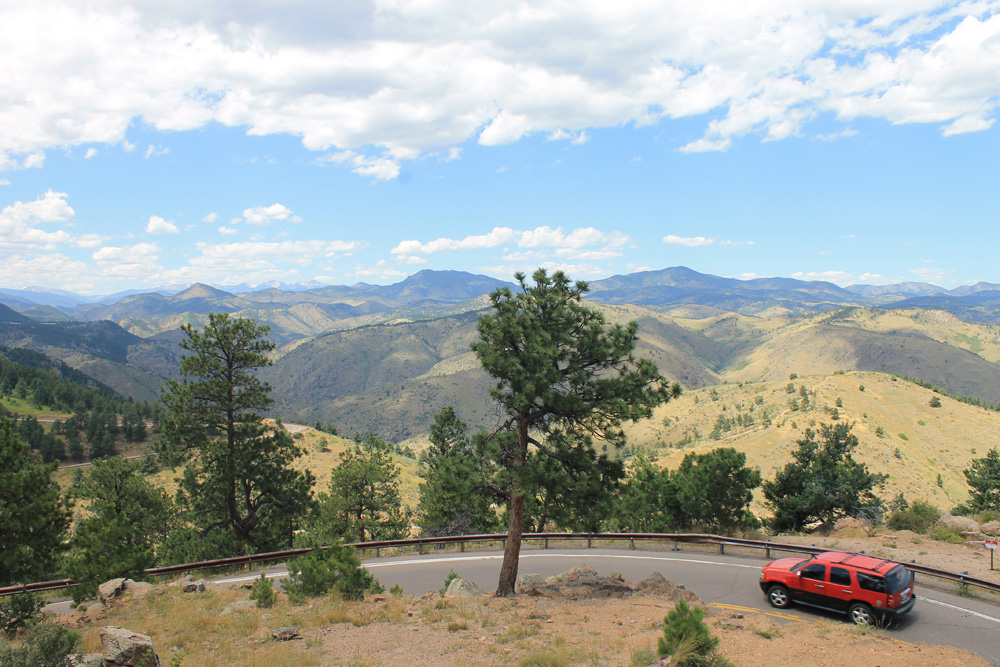
A scene from Lookout Mountain Park in Golden, Colorado (NCR photo/Brian Roewe)
Third grade lessons — and a pitch for a Prius
The desire to do more was a big motivator for Venner to join the case.
Venner places the beginning of his climate activism in the third grade. It was then that he attempted to steer his class environmental club to focus less on recycling and more on actions to address climate change, such as installing more energy-efficient light bulbs. His efforts received some resistance from the teacher. Looking back, he concedes the climate of the climate change debate "was a lot less, you know, certain at that time."
But the episode, he said, was one of the first things that "hardened my resolve on the whole issue."
During one memorable family car ride, Venner voiced his disappointment with his parents' decision not to purchase the Toyota Prius his dad, Brad, had test-driven while his mom finished signing the paperwork for a different vehicle.
"Nicholas was just having a fit that we would even consider getting a car that was not the climate-suitable pathway," said Marie Venner, who is a member of the Global Catholic Climate Movement and has contributed articles to NCR. "He didn't understand how it was even possible to make a decision like that that wasn't kind of consistent with our values."
After attempting to explain that the Prius economics didn't quite work out at the time, the family ended up with the hybrid in the end.
"He was very insistent about this stuff at a pretty young age," his mom said.
Ann Sullivan, his first-grade teacher at Our Lady of Fatima School, remembers Nick as "extremely bright" and obsessed with ocean life, especially whales, after a family vacation to the coast.
"That's how Nick spent his recess — drawing whales," Sullivan said. When asked of her reaction to learning he was part of the climate lawsuit, she said she wasn't too surprised, remembering his ability to tie anything back to the environment.
While he's had a lot of pets, Venner says what really interested him in climate change was the human element. "Because climate change is one of those things that's going to really hurt and harm a lot of people."
By middle school, Venner came to the realization that small personal acts, whether changing light bulbs, electrical sources or diets, would no longer be enough to make a difference. That to address a global problem requires a more proportional response.
"The only real option is to have systemic change," he told NCR.
A focus on environmental concern was a touchstone in the Venner family, an outgrowth of their emphasis on social justice and the intrinsic value of nature, that because it was created by God it is inherently good and thus, there's value in protecting it.
As a kid, the soundtracks for Venner family car rides were often Fr. Richard Rohr tapes. Marie still remembers one drive back from the mountains where she was listening to a talk by the Franciscan spiritual teacher. Nick, still in a car seat, chimed in from the back row. "This really makes sense."
"I didn't even know he was listening," Marie Venner said.
By grade school, Nick had accompanied his mom to several Rohr conferences in Albuquerque. He says he has "a really big fondness" for Rohr's words. He is especially drawn to what the friar teaches on selflessness, graciousness and internal virtue.
For a time, Venner considered entering the priesthood. He's put that on hold for now, but still considers it a possible way to blend his faith and activism — the latter he calls "some of the most fulfilling work out there."
In his advocacy now, Venner has talked at schools and parishes about his court case and why Catholics should care about the consequences of climate change. Laudato Si' has made those conversations with Catholics a lot easier. He said it has moved the church from being "meh" on environmental issues to be able to say that "this is an issue that's deeply important to us."
Earlier this summer, Venner helped Lebel, who is also Catholic, draft a letter explaining the case to Cardinal Peter Turkson, prefect of the Vatican's Dicastery for the Promotion of Integral Human Development.
In Venner's eyes, the Juliana case's argument about the climate as part of the public trust — a legal doctrine dating back to Roman times that certain natural resources are shared by the public and cannot be degraded or made unavailable by the government — pairs well with Catholic social teaching on preserving nature for future generations. He especially enjoys making a pro-life pitch for dealing with a warming planet. To him, it's equally important to protect the unborn and then assure they actually have an opportunity at a good life once they enter into the world.
"Ensuring that my children, if I have any, and their grandchildren and future generations as a whole are going to have a good life. I think that's a really, really strong message for a lot of people, especially Catholics," Venner said.
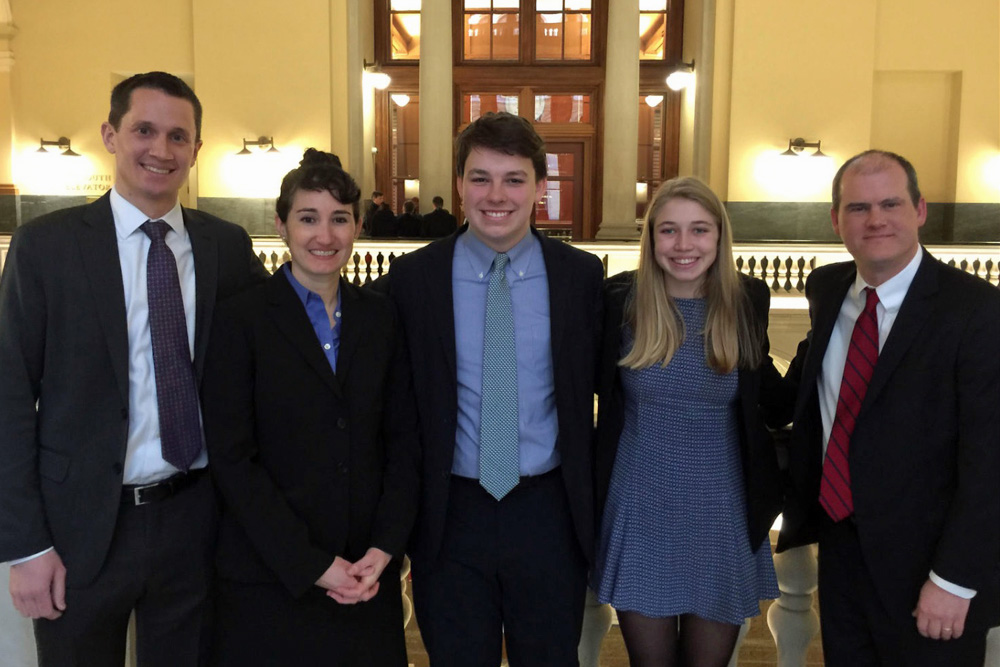
Massachusetts plaintiffs Shamus Miller, center, and Olivia Gieger, second from right, with their attorneys (Courtesy of Our Children's Trust)
Awaiting a court decision
The Juliana v. United States lawsuit was set to begin trial in an Oregon federal district court a year ago, on Oct. 29, 2018. But 10 days before that, the U.S. Supreme Court ordered a temporary stay while it heard a petition from the Trump administration. That stay was lifted in November when the nation's highest court opted not to intercede in the case.
Throughout its course, the case has been tied up in a web of legal challenges. The latest hearing in the case came in June before the 9th U.S. Circuit Court of Appeals in Portland, Oregon. There, the Justice Department argued for a pretrial appeal of the case in the latest effort to dismiss, while attorneys for the plaintiffs pushed for a halt on mining and drilling permits on public lands while the appeal is heard.
Lawyers with Our Children's Trust expect a ruling any day from the 9th Circuit.
"It's been quite a tumultuous ride," Venner said.
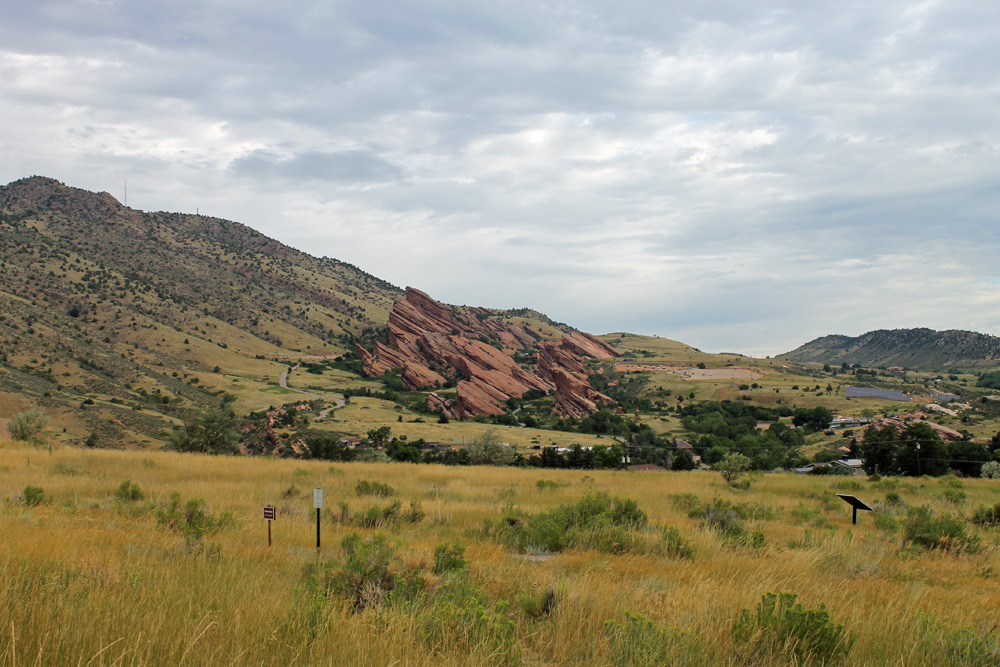
Red Rocks Park and Amphitheater in Morrison, Colorado is seen from the Mount Falcon East Trail. (NCR photo/Brian Roewe)
While the legal proceedings have played out, he admits he's gone through cycles of optimism and apathy on climate change. His spirits were high as the case approached trial last year, only to fall when the Supreme Court intervened. Another discouraging moment came when President Barack Obama opted not to settle the lawsuit after Donald Trump had won the 2016 presidential election. Still, he remains "cautiously optimistic" that he and his fellow plaintiffs will emerge victorious.
Under Trump, the Justice Department has challenged the existence of a federal public trust doctrine or that the climate would be covered by it or the Constitution. It has argued that forcing a climate plan through the judicial branch — specifically, a single district court — would subvert the powers of the legislative and executive branches.
Opinions on Juliana in the legal community span the gamut. Critics have echoed the government's arguments questioning a constitutional right to a life-sustaining climate, that such a broad interpretation would open up many other things to the same protections.
The plaintiffs' have attracted a number of amicus briefs, including from a group of 16 faith organizations (four of them Catholic institutions) and from 82 law professors. Among the signers was Rob Verchick, the Gauthier-St. Martin Eminent Scholar Chair in Environmental Law at Loyola University New Orleans and former EPA official under Obama.
"They have framed their concerns using a set of values that I think all Americans widely share," he said. Values like all people should have a chance at a healthy and safe life and that older generations have a duty to protect younger ones.
Verchick told NCR that while each of the plaintiffs' main arguments seems plausible, for the case to win will require a judge to "push beyond where the law has gone" to date.
Advertisement
Said Bellinger, one of the Our Children's Trust attorneys: "A lot of people have been doubting the case since day one, and you know, it's been four years, and we're still going. So we're feeling pretty good about the hurdles that we've overcome so far."
One area of agreement is that should Juliana reach trial, it will be monumental in that Our Children's Trust will have discovery access to troves of concealed government and industry-related information about what was known about climate change when, along with connections between fossil fuel emissions and global warming.
It wouldn't put just government officials and oil executives on the stand, but the science of climate change itself, perhaps like never before.
Nearly all 21 plaintiffs, including Venner, were set to testify at trial last year. He's already submitted several written declarations and has been deposed by the government, an experience he described as "probably the two most miserable hours of my life."
While the legal proceedings play out, the plaintiffs have been busy testifying before Congress and striking with Greta Thunberg. Venner, too, has continued giving speeches, as well as trying to live life as an average kid. All while keeping an eye turned toward an Oregon court room, all while maintaining that cautious teen optimism.
"Brown v. Board of Education didn't have a single positive ruling up until it went to the Supreme Court," he said
"So anything's possible."
[Brian Roewe is an NCR staff writer. His email address is broewe@ncronline.org. Follow him on Twitter: @BrianRoewe.]








